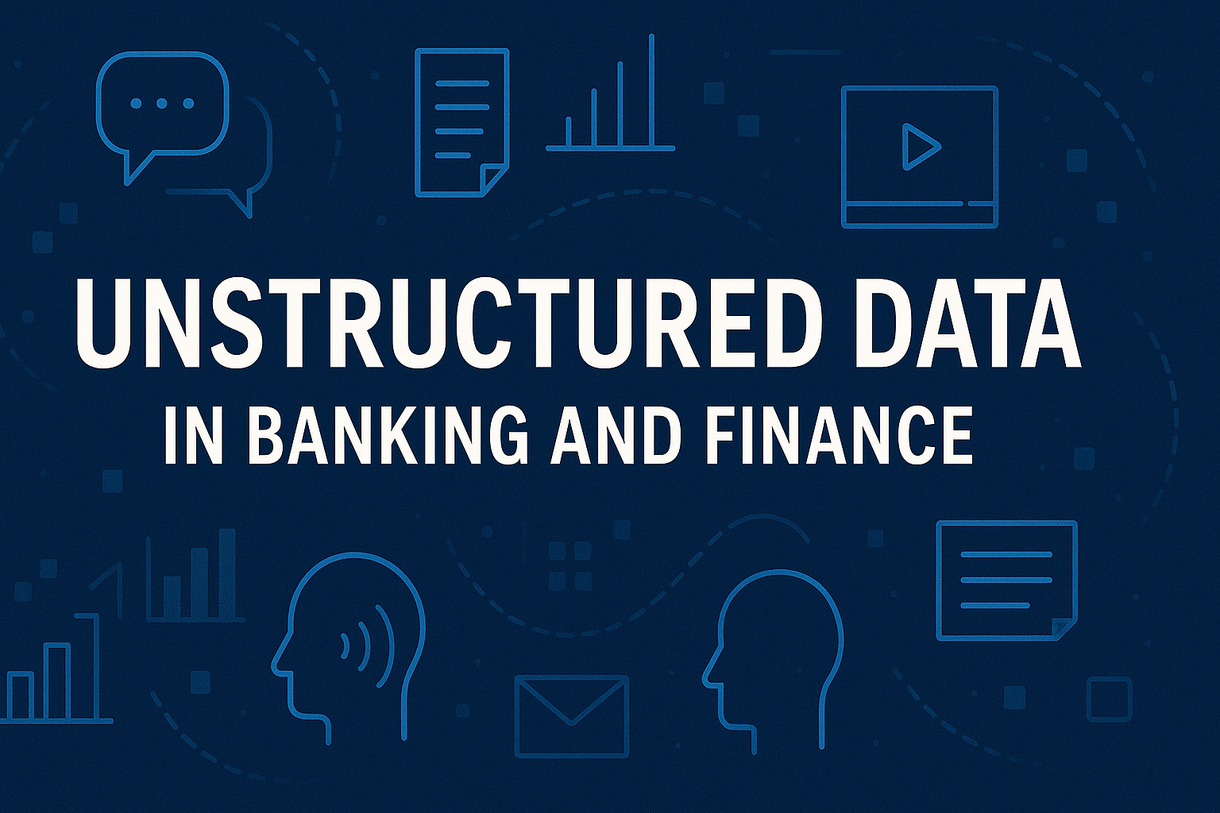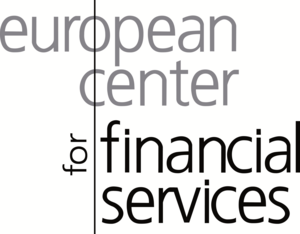Banking Symposium

In an increasingly data-driven world, banks, financial institutions, and capital markets are undergoing a profound transformation. A growing share of available information is unstructured – including textual data from analyst reports, social media feeds, voice recordings from client conversations, financial disclosures, news articles, and visual content such as satellite imagery and videos.
While traditional financial analysis has relied heavily on structured numerical data, a significant portion of valuable insights now lies beyond the boundaries of conventional databases. The ability to capture, process, and extract knowledge from unstructured data is rapidly becoming a strategic advantage.
Recent advances in Natural Language Processing (NLP), machine learning, and big data analytics have opened new possibilities to systematically leverage these vast and diverse data sources. This creates exciting opportunities--from early detection of financial risks to alternative credit scoring and investor behavior analysis.
Among others, we aim to discuss the following questions at the symposium:
- How can unstructured data sources be effectively utilized for financial analysis?
- Which technological tools and models have proven useful in finance?
- What is the role of AI and machine learning in extracting insights from text, images, and audio?
- How is risk assessment and forecasting transformed by incorporating alternative data?
- What regulatory, ethical, and data protection issues arise from using unstructured data?
- How can the integration of unstructured data improve efficiency and transparency in the financial sector?
The aim of the 28th Banking Symposium is to bring together active researchers and practitioners interested in the transformation of the banking and finance industry. The program will include several academic presentations and insights from invited experts from the business community.
We will reimburse travel costs and accommodation for presenters. Please direct questions to bankensymposium@uni-due.de.
The symposium directly preceeds the 31th DGF Jahrestagung in Hagen (September 18-20, 2025). It is possible to reach Hagen by train within 90 minutes.
Programm
13:00 Uhr – Eintreffen und Registrierung
13:30 – Block 1: Begrüßung und Einführung: Verknüpfung von Wissenschaft und Praxis
mit:
- Prof. Dr. Matthias Pelster (Direktor ecfs, Mercator School of Management, Universität Duisburg-Essen)
- Prof. Dr. Dominik Wolff (Head of Quant Research bei der Deka Investment GmbH & Frankfurt University of Applied Sciences): "KI im Asset Management - Wie KI in der Praxis einen Mehrwert schaffen kann"
14:45 – 15:15 Uhr – Kaffeepause
15:15 – Block 2: Forschungseinblicke
mit:
- Dr. Doron Reichmann (Goethe-Universität Frankfurt): "Detecting Conversation-Level Management Deception Using Response Latency"
- Dr. Andreas Knetsch (Leibniz-Institut für Finanzmarktforschung SAFE & RWTH Aachen): "Dictionaries for post-bankruptcy success prediction: A machine learning approach"
- Prof. Dr. Martin Hibbeln (Mercator School of Management, Universität Duisburg-Essen): "Watchdog or Mouthpiece? The Role of Financial News Media in Corporate Communication"
17:00 – 17:30 Uhr – Kaffeepause
17:30 – Block 3: Impulse aus der Praxis
mit:
- Prof. Dr. Kathrin Kind, M.Sc./M.A./MBA AI (Chief Data Scientist, Cognizant): "Daten sind das neue Gold. Aber was, wenn der Algorithmus den Tresor knackt?"
- Steffen Hey (Head of AI & Projectmanagement, EKM GmbH): "Unstructured Data im Finanzsektor: Zwischen Datenschutzrisiko und Effizienzsprung"
ab 19:30 – Uhr Abschluss und Get-together
- Abschlussworte von Holger Wessling (Vorstandsvorsitzender der Sparkasse Rhein-Nahe, Präsident ecfs)
Get-together bei Getränken und Snacks
Speaker
Prof. Dr. Dominik Wolff
Head of Quant Research, Deka Investment GmbH; Professor of Finance, Frankfurt University of Applied Sciences; Assistant Professor, TU Darmstadt
Dominik Wolff ist Head of Quant Research bei Deka Investment, Professor of Finance an der Frankfurt UAS und Assistant Professor an der TU Darmstadt. Seine Forschung befasst sich mit Machine-Learning-Methoden für Aktienmarktprognosen, Aktienauswahl, Natural Language Processing im Finanzwesen sowie taktischen und strategischen Allokationsstrategien. Er promovierte an der Universität Gießen und verfügt über eine berufliche Vorgeschichte als wissenschaftlicher Mitarbeiter und in leitenden Positionen im Energiemarkt.
KI im Asset Management – Wie KI in der Praxis einen Mehrwert schaffen kann
Der Beitrag zeigt auf, wie KI in der Vermögensverwaltung eingesetzt wird, um durch Vorhersage- und Auswahlmodelle messbare Verbesserungen zu erzielen. Diskutiert wird, wie Forschung und Praxis verknüpft werden, um in einem kompetitiven Marktumfeld nachhaltige Mehrwerte zu schaffen.
Dr. Doron Reichmann
Postdoktorand, Goethe-Universität Frankfurt (AccSus Department)
Doron Reichmann ist Postdoktorand am AccSus Department. In seiner Forschung untersucht er den Informationsgehalt verbaler und nonverbaler Kommunikation in Finanzmärkten mit Schwerpunkt auf dem Einsatz von Machine Learning. Besonderes Augenmerk liegt auf der Erfassung von Signalen aus Unternehmensveröffentlichungen, die wirtschaftliche Entscheidungen verbessern, sowie auf der Messung von Eigenschaften und Intentionen des Managements.
Detecting Conversation-Level Management Deception Using Response Latency
Dieser Beitrag entwickelt ein Maß für den kognitiven Aufwand von Führungskräften während interaktiver Offenlegungen auf Basis der Antwortlatenz – der Zeitspanne zwischen Frage und Antwort. Die Ergebnisse zeigen, dass eine positive Tonlage nach hoher Antwortlatenz kurzfristig zu Kursgewinnen führt, die sich jedoch im Zeitverlauf umkehren. Der Effekt ist unabhängig von der Informationskomplexität und liefert Hinweise auf absichtliche Täuschung.
Dr. Andreas Knetsch
Postdoktorand, Leibniz-Institut SAFE & RWTH Aachen
Andreas Knetsch ist Postdoktorand an der RWTH Aachen University. Seine Forschungsschwerpunkte umfassen Corporate Finance, Sustainable Finance sowie Textanalyse in Finance & Accounting. Er lehrt Corporate Valuation, Corporate Finance und Digital Finance.
Dictionaries for Post-bankruptcy Success Prediction: A Machine Learning Approach
In diesem Beitrag wird erstmals eine Analyse von Reorganisationsplänen insolventer Unternehmen vorgestellt. Mithilfe von Machine Learning entstand ein Wörterbuch, das den wirtschaftlichen Erfolg nach Insolvenz vorhersagt. Diese textbasierten Kennzahlen übertreffen bisher eingesetzte Variablen in ihrer Prognosekraft und liefern zusätzliche Informationen zur Leistungsfähigkeit überlebender Unternehmen.
Prof. Dr. Martin Hibbeln
Mercator School of Management, Universität Duisburg-Essen; Direktor ecfs
Prof. Dr. Hibbeln leitet den Lehrstuhl für Finance an der Mercator School of Management und ist zugleich Direktor im ecfs. Die Lehre deckt die Kernbereiche Investitions- und Finanzierungstheorie sowie Corporate Finance ab, mit besonderem Fokus auf Empirical Finance und quantitatives Risikomanagement. Dabei werden forschungsrelevante und praxisnahe Inhalte miteinander verbunden.
Watchdog or Mouthpiece? The Role of Financial News Media in Corporate Communication
Die Präsentation untersucht, wie Medienberichterstattung Entscheidungen des Managements zur Manipulation von Unternehmensinformationen beeinflusst. Während Medien bei „harter“ Manipulation Einschränkungen bewirken, war der Einfluss auf „weiche“ Manipulation bislang unklar. Die Analyse zeigt, dass qualitativ hochwertige Berichterstattung Manipulationsanreize deutlich reduziert – vor allem bei geringer Kontrolle durch andere Governance-Mechanismen.
Prof. Dr. Kathrin Kind-Trüller
Chief Data Scientist, Cognizant; Mitglied Global Future Council on Data Foundation (WEF)
Kathrin Kind-Trüller ist eine international anerkannte und mehrfach ausgezeichnete Expertin für Künstliche Intelligenz und Quantencomputing. Mit über 26 Jahren Erfahrung in der Technologiebranche – davon 18 Jahre in der KI – leitet sie bei Cognizant die KI- und Datenpraxis in globalen Wachstumsmärkten. Vorher war sie in Führungspositionen u. a. bei VW, BMW, Mercedes, Siemens, ZF und Bosch tätig.
Daten sind das neue Gold. Aber was, wenn der Algorithmus den Tresor knackt?
Der Beitrag thematisiert den Wandel von der traditionellen Datenspeicherung hin zur Verwaltung dynamischer, KI-generierter Datenströme und die Notwendigkeit neuer Governance-Frameworks. Er beleuchtet verantwortungsvolle KI als strategischen Wettbewerbsvorteil und geht auf die Bedrohung durch Quantencomputer ein, die einen Umstieg auf post-quanten-sichere Verschlüsselungsverfahren erforderlich macht.
Steffen Hey
Head of AI & Projectmanagement, EKM GmbH
Steffen Hey hat das GenAI-Angebot im Banking bei Sopra Steria mit aufgebaut und vereint technologisches Verständnis mit umfassendem Wissen zur Finanzbranche. Sein Ansatz zeigt, wie KI aus unstrukturierten Daten echten Mehrwert für Banken schaffen kann.
Unstructured Data im Finanzsektor: Zwischen Datenschutzrisiko und Effizienzsprung
Unstrukturierte Daten gelten einerseits als Herausforderung, andererseits als eine der größten ungenutzten Ressourcen. Der Beitrag zeigt, wie sich Datenschutzrisiken abbauen lassen und durch den Einsatz geeigneter Technologien Effizienz- und Wettbewerbsvorteile erzielen lassen.
Sponsors

We would like to thank the european center for financial services (ecfs) for the financial support!

Generative artificial intelligence (GAI) will significantly impact and change the financial and banking sector. Large language models (LLMs) are at the forefront of this evolution, transforming financial services and creating substantial opportunities. With the sharp increase in commercial applications, economic, societal, and existential risks associated with the technology also receive more attention.
The aim of the 27th Banking Symposium (September 25, 2024) was to bring together active researchers and practitioners interested in the transformation in banking and finance through GAI. The final program included several academic presentations and insights from invited experts from the industry.

Nachhaltigkeit hat bereits zahlreiche Leitbilder in Wirtschaft und Gesellschaft elementar verändert. Es wird zunehmend klar, dass Nachhaltigkeit und Profitabilität immer stärker miteinander verknüpft sind. Finanzdienstleister stehen vor der grundlegenden Herausforderung, Nachhaltigkeitsprinzipien als einen zentralen Treiber der Wertschöpfung in ihre Investmentprozesse und Risikomanagementstrategien nahtlos zu integrieren. Zugleich tragen sie als Finanzintermediäre eine erhebliche Verantwortung für den Prozess der nachhaltigen Transformation, da sie durch bewusste Umschichtungen von Kapitalanlagen maßgeblich zur Verwirklichung globaler Nachhaltigkeitsziele beitragen können.
Vor diesem Hintergrund haben die Referentinnen und Referenten des 26. ecfs Bankensymposiums die Themen Sustainable Finance und Asset Reallocation in den Mittelpunkt ihrer Vorträge und der Diskussionen gestellt.
Programmüberblick:
- The Pricing of Climate Risks on Financial Markets (Prof. Dr. Ole Wilms, Juniorprofessor für Volkswirtschaftslehre an der Universität Hamburg und Associate Professor für Finanzen an der Tilburg University)
- Passivmanagement – Steuerung des Einlagenportfolios als Herausforderung für Vertrieb und Gesamtbanksteuerung (Benedikt Brandt, Senior Manager, zeb)
- Direct Indexing – Die bessere Alternative als eine Anlage in ETFs ? (Prof. Dr. Laurenz Czempiel, Managing Partner LeanVal Invest, AR Vorsitzender LeanVal Asset Management)
- Zwischen Greenwashing und Greenness Ratings: Wie wir (echt) grüne Investments erkennen können (Prof. Dr. Gregor Dorfleitner, Direktor des Center of Finance und Inhaber des Lehrstuhls für Finanzierung der Universität Regensburg, Honorary Fellow, Hanken Centre for Accounting, Finance and Governance, Hanken School of Economics, Finnland)
- Nachhaltige Geldanlagen für Privatanlegerinnen und Privatanleger: Ein Balanceakt zwischen Umweltbewusstsein, Greenwashing, Risiken und Rendite (Dr. Matthias Horn, Post-Doc und akademischer Rat auf Zeit an der Otto-Friedrich-Universität Bamberg)
25. Bankensymposium 2022: Sustainable Finance
Das Bankensymposium 2022 hat sich dem Generalthema „Sustainable Finance“ gewidmet und die Themen "Nachhaltigkeit – der Game Changer für das Firmenkundengeschäft", "Sustainable Finance und die Rolle einer Förderbank", "Impact als strategisches Ziel – ein Überblick über aktuelle methodische Ansätze des Impact Measurements", "ESG-Steuerung Eigenanlagen – Wieviel Schmutz ist ok?" und "Nachhaltigkeitsstrategie einer Bank – der Weg und die Herausforderungen" behandelt. Wir danken unseren Speaker*Innen für Ihren Beitrag und unseren zahlreichen Gästen für die lebhafte Diskussion. Wir freuen uns auf unser nächsten Bankensymposium im nächsten Jahr.
Save the date
The 29th Banking Symposium 2026 will take place on Wednesday, September 23, 2026 in Duisburg.
4. September 2025 - Digitales Zentralbankgeld
Speaker Prof. Dr. Stefan Schäfer
23. Juli 2025 - Der digitale Euro
Speaker Dr. Jonas Gross
9. April 2025 - Duisburger Bankers Night 2025
Vortrag: Aktuelle Entwicklungen in 2025 mit Auswirkungen auf die Finanzwelt
Speaker Herrn Christian Otto
12. Februar 2025 - Narrative Economics: Wissenschaft trifft Praxis
Speaker
Dr. Sven Jung und
Dr. Frank May
Dr. Benjamin Moritz
Prof. Dr. Joachim Paul Hasebrook
22. Mai 2024 - KI-Strategien für regionale Banken und Sparkassen
Speaker Dr. Thomas Ramge
24. April 2024 - Transformationspläne und die Bedeutung einer hochwertigen Datenlage für die Steuerung der nachhaltigen Transformation
Speakerin Kristina Jeromin
06. Juni 2023 - ESG – Chance und Imperativ für Regionalbanken
Speakerin Dr. Frauke Schlütz
2023 - Net-Zero: Fact or Fiction?
Speaker Prof. Dr. Rüdiger Kiesel
2022 Workshopreihe zum Generalthema „Sustainable Finance“
Themen:
21. Juni 2022 Mit „nachhaltigen Investmentfonds“ die Welt retten – Ein (Irr)weg?
02. Juni 2022 Transparenz VO und Taxonomie – Blick in den Maschinenraum eines institutionellen Kapitalanlegers
11. Mai 2022 ESG-Ratings – Neue Entscheidungsgrundlage für Mittelstandsbanken
05. April 2022 Radar für Corporate Social Performance: ESG-Ziele systematisch ableiten und steuern



